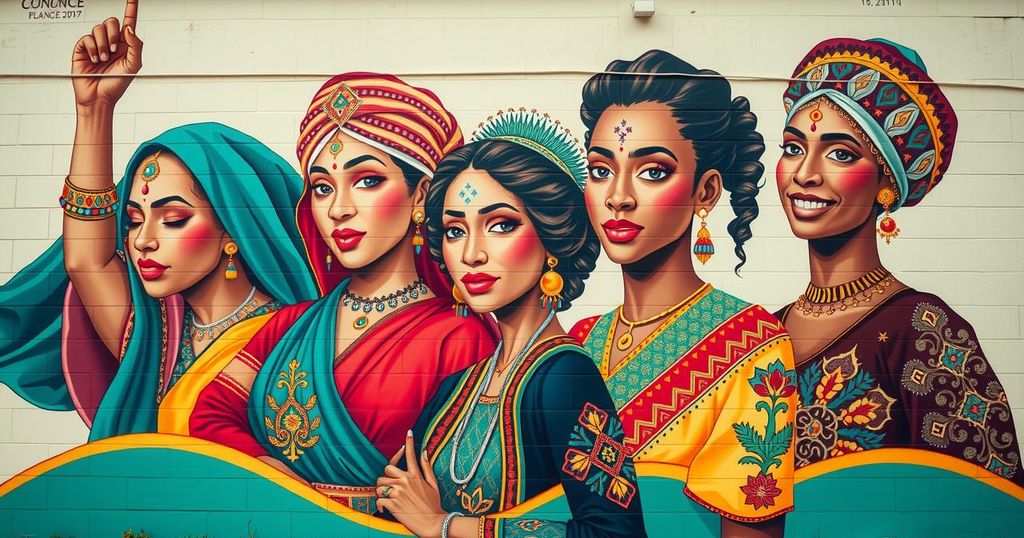Female Empowerment in Morocco: Navigating Challenges and Achievements

This article discusses the ongoing issues of female empowerment in Morocco, reflecting on the historical context initiated by King Mohammed VI’s 1999 speech. Despite progress in women’s rights, such as improved legal frameworks and political representation, significant gaps remain, as evidenced by low global rankings and persistent socio-economic challenges. The article emphasizes the urgent need for reforms and societal commitment to enhance women’s roles in public life for national development.
In a significant speech in 1999, King Mohammed VI posed a critical question regarding the advancement of Moroccan society: “How can we imagine the progress and prosperity of society if the interests of women, who make up almost half of that society, are not taken into account?” This inquiry initiates a deeper exploration of women’s roles in public life amidst growing recognition of their competencies in the realm of education and the workforce.
The question raised by the King underscores two essential points: first, a high-level commitment to enhancing women’s status and rights exists; second, there are still considerable injustices stemming from the insufficient attention to their needs and rights by society. Thus, it becomes imperative to examine the ongoing gender disparities within Morocco, assessing if these issues are rooted in constitutional frameworks, cultural legacies, or traditional patriarchal attitudes.
As of 2022, Morocco’s position in the Global Gender Gap Ranking was notably low, positioned at 136th out of 146 countries. Such a disheartening rating results from several interrelated issues, including the political apathy towards women’s issues, pervasive inequalities linked to poverty and unemployment, limited economic empowerment, and the enduring violence against women.
Recent studies indicate that women’s representation in political spheres remains starkly inadequate. A 2023 study revealed that 86.32% of women have never sought electoral office, and only 8.49% are affiliated with political parties. Despite participating in the 2021 elections, women only constituted between 24% and 38.5% of elected representatives, showcasing a disparity between electoral participation and support for female candidates.
Progress has been made towards women’s political empowerment, evidenced by constitutional guarantees for equality and Morocco’s ratification of various international gender equality conventions, including CEDAW. However, these commitments have not translated into significant increases in women’s political representation, highlighting a disconnect between legal provisions and practical outcomes.
Several barriers persist, such as societal perceptions of politics as daunting, a lack of confidence among women, their exclusion from prominent electoral lists, and financial barriers linked to campaign funding. Moreover, cultural norms often reinforce traditional gender roles, limiting women’s public engagement and further complicating their political aspirations.
The family dynamic significantly impacts women’s participation in public life; enhancing their rights within the family can lead to greater political engagement. A pressing need exists to reform the Family Code to bolster women’s rights and empower their participation in societal functions.
The absence of women in high-level political positions, as demonstrated by the all-male leadership in the recent elections of the House of Counsellors, contradicts constitutional mandates for equality. This situation highlights the urgent need for collective societal efforts aimed at bolstering women’s rights and ensuring their equitable involvement in political processes.
In the economic domain, the representation of women remains inadequate, with significant underrepresentation in high-level government positions and consistently lower wages compared to their male counterparts. Economic participation continues to be hampered by both societal expectations and structural barriers.
In summary, while Morocco has made strides in women’s rights and empowerment, significant challenges remain to ensure their rightful place in the political and public spheres. Addressing these issues is crucial for furthering women’s participation in societal aspects, which is essential for the nation’s development and prosperity.
In conclusion, Morocco’s journey towards female empowerment reflects both advancements and persistent challenges. The commitment to enhancing women’s rights has yielded some progress, yet deep-rooted societal issues and inadequate political representation continue to hinder true equality. It is essential for society as a whole to address these barriers, recognizing the profound impact that women’s participation can have on development and governance. Empowering women is not only a matter of rights; it is critical for fostering holistic national growth and ensuring ethical standards in governance.
Original Source: www.moroccoworldnews.com







